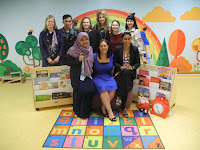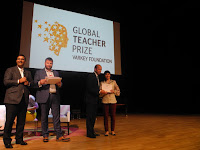How would you define global citizenship? Are education systems
really creating “global citizens”? How do we teach our children to become
global citizens? Together
with enthusiastic teachers from all over the world, I was looking for the
answers to these questions at two great educators’ events: the Varkey Teacher
Ambassadors Leadership Summit (16th-17th March 2017, GEMS
National Academy, Dubai) and the Global Education and Skills Forum (18th-19th
March 2017, Atlantis The Palm, Dubai).
My journey
to these events began from applying to the
Global teacher Prize. The Global Teacher Prize is a US $1 million award
presented annually to an exceptional teacher who has made an outstanding contribution
to their profession. The prize serves to underline the importance of educators
and the fact that, throughout the world, their efforts deserve to be recognised
and celebrated. It seeks to acknowledge the impacts of the very best teachers –
not only on their students but also on the communities around them. The Global
Teacher Prize is awarded by the Varkey
Foundation under the patronage of HH Sheikh Mohammed bin Rashid Al Maktoum,
UAE Vice President, Prime Minister, and Emir of Dubai.






As
one of Top 50 finalists of the Global Teacher Prize – 2017 I joined the group
of passionate and dedicated educators called Varkey Teacher Ambassadors. The group consists of the Top 50
finalists from the Global Teacher Prize 2015, 2016 and 2017. It is a community
of role model teachers who will help to promote best practices in education and
to promote teaching as a profession. VTAs believe that every child deserves a
supportive and encouraging learning environment, which allows them to flourish,
regardless of their background or culture.

The Varkey Teacher Ambassadors Leadership Summit brought together Top 50 finalists of the Global
Teacher Prize who worked in mini groups developing products that aim to
promote, support and engage with the GESF focus of “how to create real global
citizens”. All the VTAs prepared lesson plans, shared successful educational
practices, discussed how they could impact beyond the school context. On the
second day of the summit, the groups presented their products promoting global
citizenship education in the form of letters, essays, video, social media,
infographic posters, blogs, Padlet pages, websites and campaigns. In addition,
the VTAs got advice from the mentors on the media training (by Sheetal
Adhvaryu), developing a public presence via the media (by Ann Mroz), developing
positive PR (by Paul Mutheridge), and influencing key stakeholders (by Justin
Cooper). The VTAs were asked to bring a small item representing their country.
All these items were assembled into a peace symbol, surrounded by the VTA
community to signify that teachers stand for peace. The VTAs will continue
working on their final group products virtually after returning to their home countries.

The
next stop of my educational journey to Dubai was at the Global Education and Skills Forum, a not-for-profit initiative
organised by the Varkey Foundation. GESF brings together leaders and
practitioners from the public, private and social sectors to address the
challenges of education, employment and equality. This forum is often referred to as the “Davos
of education”. Over two days, 1,600 delegates at the Forum shared, debated and
shaped new ways for education to transform our world. The Forum started with
the powerful Welcome and Opening Address
featuring such inspirational speakers as Mr Vikas Pota, CEO, Varkey Foundation
and Mr Sunny Varkey, Founder, GEMS Education, who highlighted the importance of
bringing up real global citizens able to solve the problems of the modern world
that previous generations have failed to address. The delegates were able to
dive deeper into the question of raising real global citizens by attending
various exciting events. EdTalks
with special guest speakers delivered powerful messages, for example, how to empower
all students to achieve their academic aspirations by Ms Erin Gruwell,
Executive Director, Freedom Writers Foundation. In Debate Chamber, delegates could witness debates on topics like “Low-Cost
Private Schools in the Developing World Should Be Banned”. Delegates could meet the mentors and have in-depth
conversations with famous opinion makers, for example, listen to the
inspirational yogi, mystic, visionary, and founder of the Isha
Foundation, Sadhguru Jaggi Vasudev. Moreover, educators could also visit briefings on topics like “Technology in
the Classroom” or “Delivering Education in Emergencies”. Another option for
professional development was to visit one of the workshops on continuous learning or on increasing role of girls in
STEM or to attend masterclasses by
Top 10 Global Teacher Prize 2017 finalists. In the Future Zone delegates could interact with educational technologies
that are going to change the world: virtual children, augmented reality,
virtual reality, robots that children teach, origami mechanics, Kinects to
teach teachers and other educational technologies of the future.

If
you were hungry for inspiration, you could visit Art Experience with a celebrated artist Sacha Jafri, presenting Alice in
Wonderland - a journey through logic and making sense of the senseless. Delegates
could experience contemporary art teaching and learning and engage with
literature and the arts as an enduring and ever relevant form of expression.
Finally, if you needed to recharge your batteries, you could experience Breath Meditation by Yash to get some
energy.
The
culmination of the GESF was the Global Teacher Prize Award Ceremony where the
winner was announced and all the teachers were celebrated. 2017 winner of the
Global Teacher Prize became Maggie MacDonnell,
a Canadian national, who has spent the last six years as a teacher in a fly-in Inuit
village called Salluit in the Canadian Arctic. The Award Ceremony was
unforgettable: breath-taking singing of Andrea Bocelli; Bear Grylls jumping
from the parachute with the Global Teacher Prize trophy right to the lawn in
front of Atlantis The Palm; presidents and prime ministers greeting the
finalists and of course HH Sheikh Mohammed bin Rashid Al Maktoum awarding the
prize to the winner.

So, have we found the answers to the questions
about creating global citizens? Well, I have always known that teaching is not
only about academic achievements and test results. It is about creating a
situation of success for every student in your classroom, it is about bringing
the wider world into your class, it is about empowering our students to change
the world to make it a better place. I am sure that we can promote global
citizenship by engaging our students in cross-cultural educational projects,
like PenPal Schools, where technology brings together students from different
continents. Through such projects we teach our students to be tolerant to
religious and cultural diversity and motivate them to be active citizens.
Ann Mroz, the publishing director and editor of
TES magazine said: “If we empower teachers to be the best they can be we can
transform education – and the world”. After attending the VTA Summit and GESF I
really feel empowered and inspired and would like to share these emotions with
fellow teachers. Dear teachers, please remember that #teachersmatter






Успіх і визнання!
ВідповістиВидалитиДякую, Наталіє.
Видалити